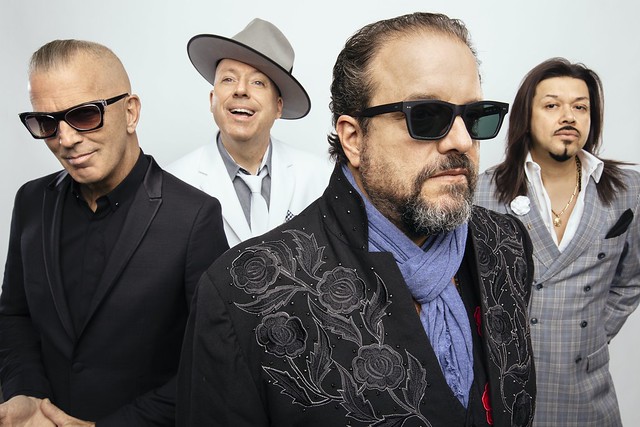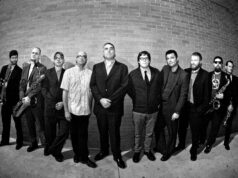
Raul Malo (foreground) fronts The Mavericks (Photo by David McClister)
(Editor’s note: This show was rescheduled from March 25 due to the coronavirus threat.)
Raul Malo is best known as the frontman of critically acclaimed band The Mavericks, who uniquely fuse classic honky tonk, rockabilly, Tejano, and pop, as well as his own Cuban background. He also released a number of well-received solo albums, mainly during a period of hiatus for the band.
Parklife DC’s Mark Engleson interviewed Raul in advance of his solo date at The Birchmere on Monday, July 13. They talked about his projects, his approach to production and songwriting, his musical background and influences, and the upcoming concert.
Mark Engleson: Hi, this is Mark Engleson, from Parklife DC. How’re you doing, Raul?
Raul Malo: Hey man, how are you?
ME: Doing great. It’s an overcast day, but there’s sunshine in my heart.
RM: [Laughs] Yeah, same here. It’s a bit overcast here, as well.
ME: You’re in Nashville?
RM: Yes.
ME: The first thing I wanted to ask you is, Julie mentioned that we switched to today because you were in the studio yesterday. Are you able to talk about what you were working on?
RM: Oh, sure, yeah. We’ve been working on a Spanish language album for the last couple of years and we’re finally coming around to the end of it. It’s actually getting finished.
ME: What kind of other projects have you been working on?
RM: Mono Mundo just put out the Sweet Lizzy roject. They’re a Cuban rock band that we brought over from Havana. And I’ve been producing another young artist from Cuba. We started his record as well. It’s been pretty busy.
ME: Do you get over to Cuba fairly often?
RM: Not often enough. About once a year.
ME: I had a chance to visit a couple years, and it’s fascinating. Havana is just an amazing place.
RM: Yeah, absolutely. I call it a beautiful mess. That’s kind of what it is. Obviously, I’m tied to it in a personal way. My parents are Cuban, and so I grew up in Miami with Cuban family. I’m first-generation Cuban American, and going back there is hard. It’s hard to see the people suffering and going without. Knowing the history of the place. You just want to do something. Politics are what they are, and we can only affect what we can affect. I figured with music, it’s that grand sort of equalizer, and, if we can affect some musicians’ lives, get their music out into the world, that’s a positive thing. That’s really the whole mission statement with Mono Mundo and what we’re doing with all these Cuban musicians.
Stream Around the World (Live) by Raul Malo on Spotify:
ME: Did your parents come over after the Castro takeover?
RM: Yes, right around that time, in the early ’60s.
ME: Growing up, was there a lot of music in your home?
RM: There was always music. My mother still plays beautiful piano, and there was always a piano around. My grandad sang, and my aunt sang and played guitar. Nobody played professionally, but there was always music around. If someone wasn’t physically playing it, there was always the stereo and records.
ME: Was country something you discovered on your own?
RM: No. Both my parents, I would say, they had good taste in music. But my dad, my dad liked country. Yeah, that’s funny. I don’t think people realize how much — I remember a lot of Cuban friends of his that actually listened to the country radio station. And, not only what was on the radio, but the old stuff like Johnny Cash, Ray Price. My mom liked Patsy Cline. It was a lot of discovery, too. Discovery, honestly, through Elvis. Elvis was a great gateway to country music. To me, Elvis was the grand cementer of all these genres. He made it all possible to connect all of them together. That was my gateway. He recorded Hank Williams songs and Kris Kristofferson songs. He would record a lot of the country hits and do it his way.
ME: Wasn’t “Blue Moon of Kentucky” a bluegrass song?
RM: It was a Bill Monroe bluegrass song. Even early on, Elvis was tying a lot of those things together without probably meaning to or realizing what he was doing. He was, in many ways, the grand cementer for me.
ME: You’re going to be at The Birchmere on March 25. Do you have some fond memories of the venue?
RM: The Birchmere has really been like a home away from home. It’s one of my favorite venues. It’s been there forever. They’re such great advocates of music and and musicians. You get there and they treat you right. It’s nice, you don’t have to get a hotel room. You can hang out there. They feed you. Not only that, but professionally too, it’s always a pleasure there. It always sounds great. They’ve got their guy who does a great job. I have a lot of going memories going back 15, almost 20 years I’ve been playing there.
ME: You’re going to be solo on that date?
RM: These are my solo shows. I go out by myself. I tell stories and whatnot. It’s like a Mavericks show, just a lot lamer.
ME: When you’re playing solo, do you prefer to be more spontaneous or to work with a gameplan?
RM: I go in with an idea, maybe. A suggestion, perhaps. But I don’t do a set list. I play to the room and go with the vibe of the night.
ME: You can’t do that with a band.
RM: No, you can’t do that with a band. We can call certain songs and we can do certain things. And we do. We’ve been playing together for a long time. But not with the freedom like by yourself, where you can do whatever you want. I like that. It’s also scary, too. It’s good to get out of your comfort zone.
Stream Play the Hits by The Mavericks on Spotify:
ME: You mentioned a few things you’re producing. How do you approach working as a producer?
RM: The first thing I do is get to know the artist. Get to know their music, get to know what they like, what they don’t like. Get their vibe, and get what their vision is, what they want to achieve from the recording itself. We go from there. Depending on what artists wants to do or achieve, that’s how you approach the recording. And that’s how you approach the songs, from the style of songs that the artist writes. There’s no set approach that I follow. Certainly, you want things to sound good, so you do check with your engineer that you have all the technical stuff. But musically, style-wise, it really depends on the artist. Your job as a producer is to facilitate the artist’s sound that they hear in their head, their idea for what they want to achieve with the record.
ME: When it comes to songwriting, do you have particular habits or rituals?
RM: [Laughs.] That’s the thing about it. Just when you do, they get turned on their head. I think it’s important to be open. You can have your rituals, have your comfort zone, but I think it’s also important to to be the open to the fact that it could happen at any time. I like that. I like that about music. I like that about what we do. I keep it open that way. Yeah, there’s a certain guitar I like to write with. But honestly, if that guitar is not around, you’ve got to get the job done and fine something else. It just depends. You could be at the most luxurious spa with a hot tub and serenity and you think, “Oh man, it’s going to be great for writing. And nothing gets done. You can be in the most chaotic downtown pub and the napkin and the waitress’s pen might be your best options at that point. You take it as it comes, I think. At least, that’s what I do. I’m disciplined enough to write every day or to create every day, so when it happens it happens.
ME: Do you have be more disciplined when it comes to doing co-writes?
RM: Well, you have to show up. [Laughs] You have to at least do that. A co-write happens more when you know the other person and you’re already a bit comfortable. I don’t go into co-writes never having met the person that I’m writing with. I think that’s really difficult, and almost impossible to achieve anything. But, that’s just me.
ME: And there are songwriters who are just kind of in that farm system…
RM: Sure. Like I said, nothing wrong with that. Everybody has their method. But I don’t have to do that. I’m not hustling it as a songwriter every day to get my covered by artist that are out there. I’m working with specific artists, and I write for myself.
ME: At this point in your career, how much are you on the road?
RM: We’re on the road for almost 100 shows a year, which is a good chunk of the year.
ME: The last thing I wanted to ask is, have you been listening to anything interesting lately? Any discoveries?
RM: Sure! There’s always stuff that people are turning me on to. There’s a group out of Cuba called called The Font that’s really interesting. There’s, gosh, I can never say their name, but they’re kind of brilliant. A trio, and they have this strange name: it’s B-something. It’s a trio, and it’s instrumentals, but it’s funky as heck. The guy’s a really, really great guitar player. I’m blanking on their name right now.
There’s always something that somebody’s turning me onto. There’s a lot of great music that doesn’t make it to the mainstream. But people find it, and they support it, and artists can flourish with the support from major labels and from radio. It’s difficult, no doubt, but it can be done. I see proof of it every day.
ME: Someone once commented that on the book rating site, Goodreads, the most interesting stuff isn’t at the top of the end of the scale, four to five, but the stuff that scores three to four, because it was distinctive enough that it was not to someone’s taste. In the same way, sometimes the really mainstream music can lack character.
RM: I equate what we do to a little restaurant in a cool part of town. If you’re on the highway, you’ve got your Cracker Barrels, you’ve got your McDonalds, all the stuff up and down the highway. If you really want a good restaurant, you’d better get off the highway and find it. That’s what we do and that’s what other musicians do. If you’re lucky, and you work hard — that’s what we do.
ME: I love the analogy! I want to thank you so much for taking the time to talk to us, and I look forward to your show on March 25.
RM: Thanks man, I appreciate it.
**
See Raul Malo live! Buy your tickets online now.
Raul Malo
The Birchmere
Monday, July 13
Show @ 7:30pm
$39.50
All ages






